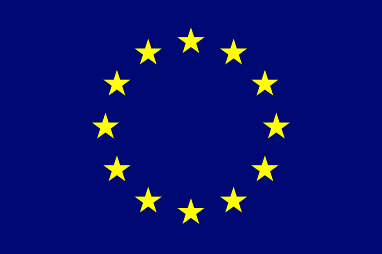Publications
Throughout the year, VOICE produces and disseminates key documents reflecting on humanitarian aid issues at the EU level and from an NGO perspective. They are addressed to decision-makers within the European institutions, at the National level, to NGO networks and other stakeholders of the humanitarian community, as well as to the VOICE members. Some documents are produced by the VOICE Secretariat with the support of VOICE members while others are publications from members and other key stakeholders in the humanitarian sector.
Please note that members-only documents will not be visible unless you are logged in.
-

NGO reaction to the "Brussels III" Conference on Supporting Syria and the Region, 14 March 2019
15 March 2019Following the III Brussels Syria Conference, 15 aid agencies, including many VOICE members, called for a sustained follow-up to ensure political and funding support translates into meaningful improvements for all Syrians. -
Caritas Position Paper on Brussels III Syria Crisis Conference, March 2019
13 March 2019Members' publicationsCaritas Position Paper written for the Days of Dialogue of Brussels III conference for “Supporting the future of Syria and the region” that took place in the European Parliament on 12-13 March 2019.
Caritas delegates from both Europe and the Middle East participated to represent the entire Caritas confederation. Committed to helping on the ground, the confederation wants to remind that Syrians are experiencing major needs, whether as displaced persons in the country or as refugees in neighboring countries. -
NGOs & Risk: Managing Uncertainty in Local-International Partnerships Global Report
12 March 2019This report examines how risk is perceived and managed in partnerships between international and national NGOs working in humanitarian response. It follows from the 2016 report NGOs and Risk: How International Humanitarian Actors Manage Uncertainty, which was also produced by Humanitarian Outcomes under the leadership of InterAction. The study was funded by the U.S. Agency for International Development’s Office of Foreign Disaster Assistance (USAID/OFDA) and benefited from the direct engagement of 10 international humanitarian NGOs. The research encompassed interviews with 117 humanitarian practitioners, undertaken remotely and in field visits to South Sudan and Nigeria, 446 survey responses from (mostly national) NGO field staff, and a systematic review of relevant policies from the participating organizations. In analyzing this evidence, the report identifies the trends, challenges and promising practices in this area, with the aim of strengthening partnerships for improved humanitarian action. -
Aid in Limbo: Why Syrians deserve support to rebuild their lives
12 March 2019Members' publicationsThe crisis in Syria is entering its ninth year. With a reduction in active violence, there is a need to consider how the aid response is best meeting the needs of conflict-affected Syrians. Yet the political stance of donor governments, combined with access restrictions in Syria, is preventing humanitarian actors from supporting Syrians with sustainable access to basic services and livelihoods. This paper explores the changes that are needed to adapt the response to deliver the support Syrians themselves want. -
-
Joint INGO messages– Yemen pledging Conference, 26 February 2019
26 February 2019A number of NGOs, including several VOICE members, wrote a joint message in view of the 2019 High-Level Pledging Event for Yemen requesting donors to give adequate levels of funding to implement the UN Yemen Humanitarian Response. Moreover, the NGOs urged the donors and the international community to support measures that protect Yemeni civilians, demand accountability for violations and disregard for the laws of war, along with peace negotiations and pressure their allies to find a peaceful political solution to the conflict in Yemen. -

Save the Date: Grand Bargain workshop in London
25 February 2019The save the date of the Grand Bargain workshop in London "Risk Sharing to reach the ‘Grand’ Bargain?" -
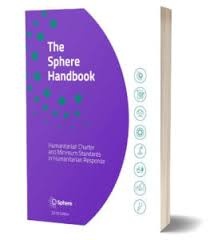
New Sphere Handbook: Launch event in Brussels
21 February 2019The full agenda of the event VOICE is co-organising with Sphere for the launch of the 4th edition of the Sphere Handbook, one of the most widely recognized tools for the delivery of the quality humanitarian response. -
No choice : It takes a world to end the use of child soldiers
12 February 2019Members' publicationsThis report makes recommendations for governments, the international community (including the United Nations and donors) and organisations working on the ground in order to prioritise the protection of children in humanitarian responses and prevent children’s engagement with armed forces and armed groups. -
Access to Humanitarian Services for People with Disabilities
23 January 2019Members' publicationsIn December 2017, an assessment was carried out by Humanity and Inclusion (HI) together with the International Organization for Migration (IOM) in Bentiu Protection of Civilian (PoC) site to increase the understanding of the situation of persons with disabilities in Bentiu PoC, including the barriers and facilitators faced by people with disabilities in accessing needs-based services. Programmatic gaps in the access of people with disabilities to camp management, Water, Sanitation and Hygiene (WASH), Shelter/Non-Food Items (NFI), Health, and Protection services were assessed between December 13 and 20 through ten focus group discussions (FGDs), nine key informant interviews (KIIs), 663 house to house surveys, and 22 direct observations of services. The assessment targets included not only people with disabilities living within the PoC site, but also their caregivers and families as well as those service providers and protection actors responsible for meeting their basic needs.
The assessment identified that there is scope for improvement of efforts to a create respectful and sensitive environment for people with disabilities with the support of the site populations as well as humanitarian aid workers. The assessment took into account men and women, boys and girls, as well as the elderly, all with various disabilities including those with visual, hearing, intellectual and mobility impairments, as well as those with mental health problems.
As a result of this assessment, recommendations have been made to improve the situation of people with disabilities living within the Bentiu PoC site. -

Letter from ECHO to FPA Partners - Extension of 2014 FPA
20 December 2018FPA Watch Group -
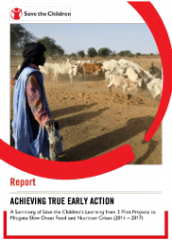
Achieving True Early Action: A summary of Save the Children's learning from 3 pilot projects to mitigate slow onset food and nutrition crises (2014-2017)
13 December 2018Members' publicationsIn many countries, resilience and development gains continue to be undermined by recurrent, predictable slow onset food and nutrition crises. Despite early warning signs, the humanitarian community is slow to react, only after lives and livelihoods already have been lost. In an attempt to battle this problem, Save the Children UK has been investing in internal financial and technical resource toward early action. This means reacting to forecasts of a potential crisis before it has escalated to be defined as such.
This document draws on the findings of an external evaluation and internal reviews and analysis to consolidate the learnings of three Early Warning projects. The report is aimed at NGOs, donors, and governments who would like to learn how we can better institutionalize early action responses in countries that are susceptible to slow onset crises. -
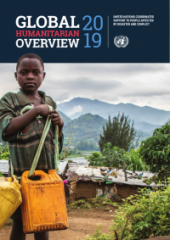
Global Humanitarian Overview 2019
13 December 2018We are witnessing extremely high levels of humanitarian need even as global wealth is higher than ever before. This year’s Global Humanitarian Overview (GHO) therefore provides, for the first time, an analysis not just of how many people need humanitarian assistance, but a clearer understanding of why.
The humanitarian response plans outlined in this year’s GHO are the result of in-depth, country-by-country analysis of the most comprehensive data available. Funding requirements are projected to be comparable to last year. While some crises have escalated, this year we also have better prioritization of the most vulnerable and severely affected people, and a stronger coordination with development partners to ensure a focused humanitarian response.
Despite the challenges, the humanitarian system is more effective and impactful than it has ever been. We are better at identifying different groups’ specific needs in crises and quicker to respond when disasters strike. Response plans are more inclusive, comprehensive, innovative and prioritized. We have a better picture of needs and vulnerabilities. And we have dedicated networks in more than 20 countries to protect people from sexual exploitation and abuse. All of these factors allow us to design effective responses that save lives and protect livelihoods.
-
Sharing NGOs perspective on the Grand Bargain at the Cohafa
13 December 2018VOICE; CARE and NRC at the COHAFA sharing NGO perspectives on the Grand Bargain and good practices from EU Member States -
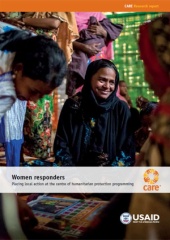
Women responders: Placing local action at the centre of humanitarian protection programming
12 December 2018Members' publicationsThis global research report by CARE International aims to answer a key question: How is the humanitarian protection sector ensuring the participation and leadership of women responders? The report provides a comprehensive review of collaboration between humanitarian actors and women responders, and provides recommendations and guidance for humanitarian actors and donors in order to increase the participation and leadership of women responders, and improve humanitarian response overall. -
Based on need alone? Impartiality in humanitarian action
07 December 2018Members' publicationsWhat lies at the heart of humanitarian action? And what are the biggest challenges it faces? Both these fundamental questions lead us to the principle of impartiality:
Humanitarian action should help people solely on the basis of their needs. It must never discriminate according to other criteria such as gender, religion, ethnic background or political orientation. This collection of texts by MSF, Caritas Germany, and Diakonie Katastrophenhilfe examines how the core humanitarian principle of impartiality is dealt with in theory and in practice. -
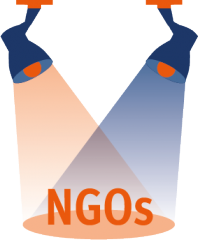
Partners' Conference 2018 - Speech of VOICE President - Dominic Crowley
06 December 2018Speech by Dominic Crowley, President of VOICE, delivered on the 20th of November 2018 at the occasion of the ECHO Annual Partners' Conference.
Check against delivery. -

VOICE Statement on the next Multiannual Financial Framework (MFF)
06 December 2018VOICE position papersThe VOICE network shares the following remarks and recommendations with the EU Member States and the European Parliament on the next Multiannual Financial Framework. -
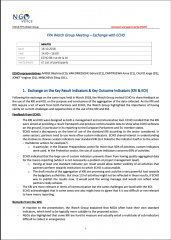
FPA WG minutes - Exchange with ECHO - 18 October 2018
06 December 2018FPA Watch Group -

Joint letter from NGO networks to the European Heads of States- Heading VI, next Multiannual Financial Framework(MFF)
05 December 2018A joint letter co-signed by VOICE, Concord, CAN, EuroDad, EPLO in advance of the European Council on 13-14 December in order to outline recommendations on EU external action in the next Multiannual Financial Framework (MFF), specifically on Heading VI (Neighbourhood and the World). -
VOICE out loud 28- Adressing protection needs in humanitarian action
16 November 2018VOICE out loudIn this edition of the VOICE out loud, VOICE members reflect on different aspects of protection in their humanitarian operations. We hear also from Mr. Walter Fuelleman, ICRC representant in Brussels, on how protection work is changing and what in the EU can support or hinder this. -

Merging of EUAV with the European Solidarity Corps 2021-2027 - VOICE key messages
07 November 2018VOICE position papersThis paper gathers a number of remarks on the European Commission’s proposal for the European Solidarity Corps (ESC) Programme under the next financial period (2021-2027) which includes the integration of the EUAV into this larger EU Programme, building on the VOICE network’s positions over the last years. -

Agenda of the Grand Bargain simplification workshop in Paris
30 October 2018The detailed agenda of the Grand Bargain workshop in Paris. -
Resilience: Why the divide is artificial, and the opportunities are real
18 October 2018Members' publications“Nexus Mysteria”? Why the divide is artificial, and the opportunities are real
It should not matter what logo, flag or funding source someone represents when they look into the eyes of a mother who has lost a child because of war, or a father who cannot feed his family because the rain did not fall this season, or a child who has only ever known a constant hunger twinge in their stomach.
While we always need to nuance, and ensure appropriate, contextualised approaches based on the needs of those most affected by conflict, poverty or humanitarian crisis, there is
artificial distinction between those involved in humanitarian and development and peacebuilding. -
2018 Global Hunger Index: Forced Migration and Hunger
11 October 2018Members' publicationsThe 2018 Global Hunger Index (GHI) shows that the world has made gradual, long-term progress in reducing overall hunger, but this progress has been uneven. Areas of severe hunger and undernutrition stubbornly persist, reflecting human misery for millions.

